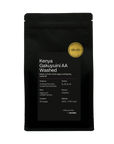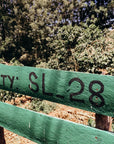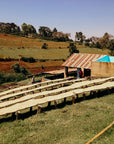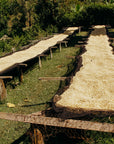SL 28 and SL 34 are the traditional varieties cultivated in the country since the early 1900s. They have the potential for high cup quality and high yields, but also highly vulnerable to adverse elements. The AA-grade indicates this coffee is of the highest quality, determined by the beans’ size and density according to the regulations governing the Kenyan coffee trade.
It is a long held belief that the washed process fully unmasks a coffee’s authentic character allowing the consumer to taste variety and terroir. It is still the norm for post-harvest processing at the cooperative-run coffee factories in Kenya. Selectively hand picked ripe cherries are further sorted for defects before being sent into pulping, which removes the skin and pulp from the seed. Residual mucilage is then removed through fermentation in tanks, followed by washing to scrub off any remaining traces of mucilage, and a soak.
This lot grown by the Thirikwa Coffee Farmers Cooperative Society and processed at the Gakuyuini factory, i.e. washing station or wet mill, was fermented in a shaded area and stable ambient temperatures for approximately 24 hours. Following that, they were de-pulped and de-mucilaginated, and then washed and followed by a 16-18 hour soak using clean water from the Gatomboya stream.
The coffee seeds in parchment at this stage would have a moisture level of around 55%, which would be further reduced to 10-12% by laying them out to dry on raised beds under the sun between 14 - 21 days.
Kenyan coffee is memorable for many specialty coffee lovers because it is generally fragrant, clean, juicy, complex, and also fuller-bodied, which is uncommon in most other fully washed coffees from other origins.








